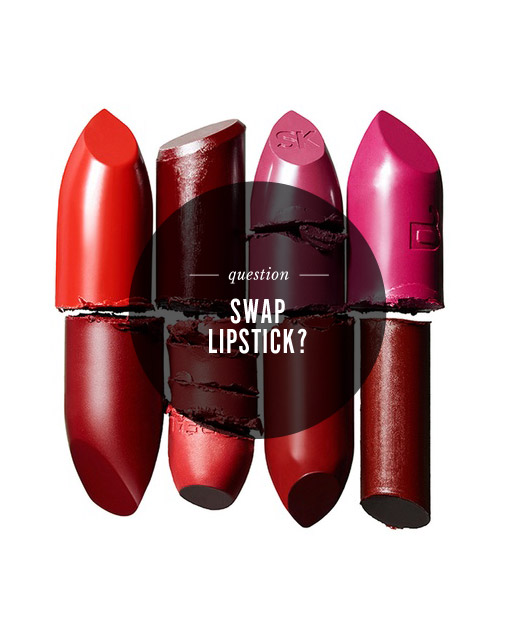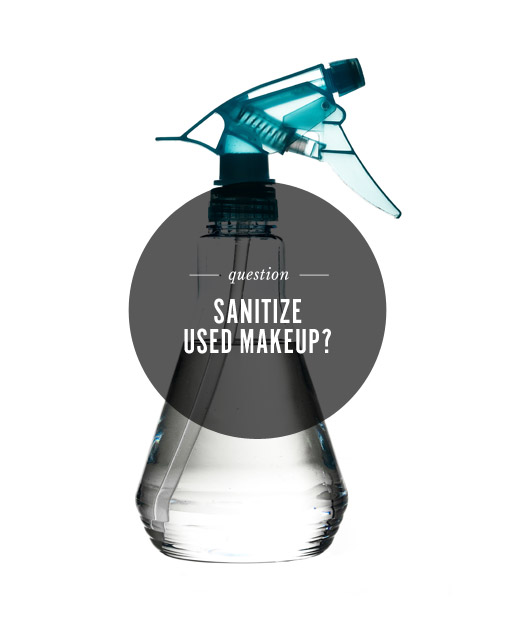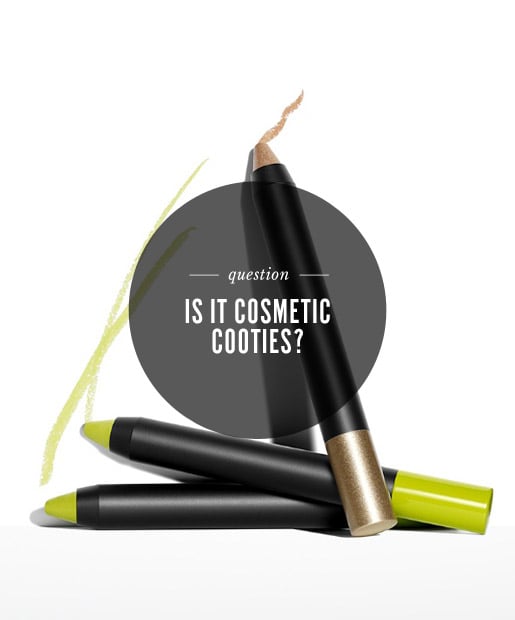"You won't get herpes from a lipstick. Just be careful, sanitize well and use common sense. You think that when you go to a makeup artist they use brand new makeup and brushes on every person? Of course not, but they do clean everything between uses." - Kathleen on TotalBeauty.com
Experts say: Sharing or lending lip products always seems innocent ("Can I borrow some chapstick?"), but the cringe factor rises exponentially when you think of the viruses that fester on lips -- viruses that experts point out, are much smaller than bacteria and much harder to kill. I'm still scarred by the news that a women was suing M.A.C. after she allegedly contracted herpes after an artist applied a RiRi Woo sample to her lips, and both Hammer and Ostad said I was traumatized for good reason.
According to Hammer, lip products get a red flag thanks to herpes labialis, the infection caused by herpes simplex virus, which can live on oil-based products like lipsticks, chapsticks and gloss and get further smudged into the product every time you reapply. The next time your lip sprouts small, painful cold sore blisters, you may want to retrace your cosmetic steps ... and just looking for unsightly cold sores in your circle of friends may not always help in your detective work. "Your friend may be shedding virus and not realize she's getting a cold sore," says Dr. Ariel Ostad, a dermatologist and cosmetic dermatologic surgeon, For the uninitiated, the "viral shedding" phase is when the virus is traveling along nerves to the surface of the skin. The virus is contagious at this stage, but not visible. Tricky virus.
Experts say: Sharing or lending lip products always seems innocent ("Can I borrow some chapstick?"), but the cringe factor rises exponentially when you think of the viruses that fester on lips -- viruses that experts point out, are much smaller than bacteria and much harder to kill. I'm still scarred by the news that a women was suing M.A.C. after she allegedly contracted herpes after an artist applied a RiRi Woo sample to her lips, and both Hammer and Ostad said I was traumatized for good reason.
According to Hammer, lip products get a red flag thanks to herpes labialis, the infection caused by herpes simplex virus, which can live on oil-based products like lipsticks, chapsticks and gloss and get further smudged into the product every time you reapply. The next time your lip sprouts small, painful cold sore blisters, you may want to retrace your cosmetic steps ... and just looking for unsightly cold sores in your circle of friends may not always help in your detective work. "Your friend may be shedding virus and not realize she's getting a cold sore," says Dr. Ariel Ostad, a dermatologist and cosmetic dermatologic surgeon, For the uninitiated, the "viral shedding" phase is when the virus is traveling along nerves to the surface of the skin. The virus is contagious at this stage, but not visible. Tricky virus.
The verdict: No. Oil-based products are generally lower risk than water-based products, but higher risk than powders because they're usually applied on susceptible and sensitive areas like your eyelids and lips. If you like to live dangerously, Hammer says you can sharpen eyeliners and lip liners or hack off the top of lipsticks in an attempt to get rid of some surface bacteria, but it's still a gamble. There's no way to tell how far a virus has traveled.
"Viruses can't survive long enough outside the body to be transmitted through makeup that's been mailed and then properly sanitized. Using rubbing alcohol (of at least 70% volume or higher) and a spray bottle you can gently spray the top of your makeup and it should kill at least 99% of germs!" - Devin on Facebook
Experts say: I asked Hammer to watch the video posted on Makeup Exchange that instructs users on sanitizing makeup with alcohol before they ship it off to a new home, a practice many Facebook users also swore by. I was still skeptical -- it can't be that easy, can it? "There's actually some good information in this video, and some of these tips will help keep makeup products relatively germ-free," he cautiously began. But ... (you knew there was a but). "But sanitizing makeup with alcohol will generally only treat the surface, and may not be able to reach bacteria that's been pushed deeper into the product," he says.
Experts say: I asked Hammer to watch the video posted on Makeup Exchange that instructs users on sanitizing makeup with alcohol before they ship it off to a new home, a practice many Facebook users also swore by. I was still skeptical -- it can't be that easy, can it? "There's actually some good information in this video, and some of these tips will help keep makeup products relatively germ-free," he cautiously began. But ... (you knew there was a but). "But sanitizing makeup with alcohol will generally only treat the surface, and may not be able to reach bacteria that's been pushed deeper into the product," he says.
The verdict: No. As with the whole general concept of makeup exchange, Hammer says there are just way too many unknowns to rely on this method. "To me, it's a bit like finding a tasty-looking, half-eaten sandwich on the ground, and then cutting off the part where someone else was eating it, wiping off the rest of it, and then hoping that it will be safe to eat. But how long was it on the ground? Did anything unusual happen to it while it was there? Maybe the person who was eating it had the flu?" Touché, Mr. Hammer. Touché.
"No, I wouldn't swap used makeup. [I'm] afraid of eye infections (which I got at a BareMinerals store) or getting a cold sore, which I've never had before." - Karen on Facebook
Experts say: OK, so you didn't heed expert advice and woke up red and swollen. How can you really tell if it's your grody, infected eyeliner or merely a bad reaction to that particular brand of makeup? "An allergic reaction will usually lead to redness, hives and possible swelling," says Ostad. "An infection or anything related to bacteria on the other hand may lead to sores, red spots, blisters and massive swelling on the face."
Experts say: OK, so you didn't heed expert advice and woke up red and swollen. How can you really tell if it's your grody, infected eyeliner or merely a bad reaction to that particular brand of makeup? "An allergic reaction will usually lead to redness, hives and possible swelling," says Ostad. "An infection or anything related to bacteria on the other hand may lead to sores, red spots, blisters and massive swelling on the face."






